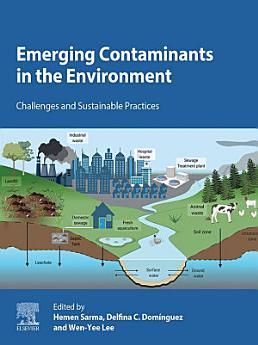Emerging Contaminants in the Environment: Challenges and Sustainable Practices
About this ebook
About the author
Dr. Hemen Sarma obtained his Ph.D. in Environmental Botany [2008] from Gauhati University and pursued post-doctorate research at North-Eastern Hill University, Shillong and Institute of Advanced Study in Science and Technology [IASST], Guwahati, India. Presently he is serving as Senior Assistant Professor at Nandanath Saikia College, Dibrugarh University, India. His research interest includes plant-microbe interactions, and microbial nanobiotechnology. He made significant contributions to the field of emerging contaminants, endocrine disrupting compounds and persistent organic pollutants. Dr. Sarma has more than 50 publications to his credit in peer-reviewed international journals.
Delfina C Dominguez is a Professor at The University of Texas at El Paso, USA. She completed her Ph.D. in Molecular Biology from New Mexico State University and postdoctoral studies from The University of Virginia. Her research interests include Molecular diagnostics, antimicrobial resistance and calcium signaling in Bacteria The focus of Dr. Dominguez’s work is in bacterial physiology and pathogenesis. Currently, she has active collaborations with other investigators to develop and validate point of care devices for rapid identification of pathogens as well as clinical biomarkers. Dr. Dominguez has over 46 publications to including conference papers and book chapters, and over 900 citations.
Wen-Yee Lee is Associate Professor of Chemistry and Biochemistry at University of Texas at El Paso, USA. She completed her Ph.D. in Environmental Science and Engineering from the University of Texas at El Paso, and Postdoctoral Research from Connecticut Agricultural Experiment Station. Dr. Lee studies organic pollutants in the environment, and their impacts on human health. Her research area is a unique field in the chemistry department and is in line with the university’s vision in interdisciplinary research. Dr. Lee was a 2016 Interdisciplinary Research Fellow awarded by UTEP Office of Research and Sponsored Projects and the Office of the Provost. As an IDR Fellow, Dr. Lee organized the Water Research Group which include researchers from UTEP, Texas A&M, NMSU, New Mexico Tech, and three international universities to study water quality at local, regional, and global scales. Dr. Lee’s research interests are method development, determination of organic pollutants in the environment, and their impacts on human health. Dr. Lee has over 65 publications including conference papers and over 885 citations.







